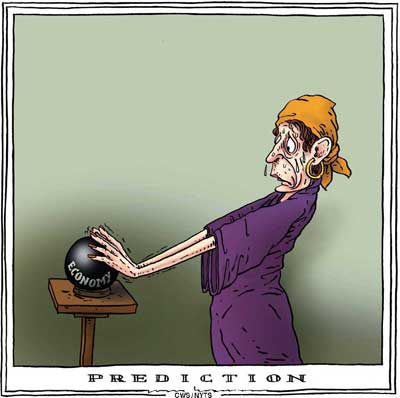
Joe Weisenthal is wrong. The reporter at Business Insider recently wrote that everyone predicted the unfolding economic disaster in Europe. Not so. It’s what he predicted, it’s what I predicted, but it’s not at all what many people were predicting.
And the people who got it completely wrong happen to be the people still running European economic policy.
As the economist Jonathan Portes pointed out in his blog, it is now more than two years since Olli Rehn, the European commissioner for economic and monetary affairs, declared that “Europe’s recovery in the real economy has taken hold and is becoming self-sustaining.”
Mr. Rehn is still in place at the European Commission, and he’s still telling us that austerity will work any day now. And he’s not alone. The economics team at the Organization for Economic Cooperation and Development that told us in May 2010 not just that Europe needed fiscal austerity, but that the Federal Reserve needed to raise rates by the end of the year to head off inflation, is still issuing reports. And then there’s Britain’s David Cameron and George Osborne.
Readers sometimes complain about my frequent references to the things my friends and I got right and others got wrong. But look, it’s not ego (or anyway, it’s not just ego). Predictions help economists to judge between models. If the world delivers results that are very much at odds with what your framework says should have happened, you’re supposed to reconsider your framework — as I did, for example, after I was wrong about interest rates in 2003.
And the fact is that a more or less Keynesian framework — a framework that says that austerity in a depressed economy is a terrible idea — has yielded pretty good predictions throughout the crisis, while the anti-Keynesian stories that became the conventional wisdom in Brussels and Frankfurt have delivered what has turned out to be an awesome record of predictive failure.
Yet European leaders seem determined to learn nothing, which makes this more than a tragedy; it’s an outrage.
The 90 Percent Zombie
The economist Mark Thoma recently pointed me to a post on Quartz written by Miles Kimball titled “What Paul Krugman Got Wrong About Italy’s Economy.” So I wondered what important features I got wrong — but to my great disappointment all I found was yet another invocation of the claim from Harvard economists Carmen Reinhart and Ken Rogoff that bad things happen when debt reaches about 90 percent of gross domestic product.
Look, that is not an established result. It’s a correlation; but it could just as well reflect a pathway from slow growth to high debt, or from third factors like political and institutional dysfunction to both slow growth and high debt.
This last possibility becomes especially persuasive when you look at the full list of advanced countries that have exceeded the supposed 90 percent threshold in the past 50 years: Japan, Italy, Belgium, Greece. That’s it. So yes, Japan and Italy have had high debt and slow growth, but do you really want to say that debt was the only reason for slow growth, or that the Japanese slowdown of the 1990s had no role in causing the rise in debt? Do you really want to say that debt is the only reason for Italy’s poor performance? If your answer to either question is no, you have just said that you don’t believe in Reinhart-Rogoff’s results.
So why do people imagine that this is a definitive result?
That’s obvious. The Reinhart-Rogoff claim on debt got picked up eagerly by deficit scolds, because it said what they wanted to hear. Then it became orthodoxy through what we might call the Scarborough effect: Very Serious People heard other Very Serious People citing the alleged finding, then repeated it themselves, and it became part of What Everyone Knows — after all, everyone they talked to said it was true.
Is Reinhart-Rogoff itself a zombie? Not quite — it could still be true, although I don’t think so. But the idea that the 90 percent threshold is a definite result, established beyond question, is very much a zombie idea — one that has been killed repeatedly but just won’t stay down.
And professional economists, at least, should know better.
Angry, shocked, overwhelmed? Take action: Support independent media.
We’ve borne witness to a chaotic first few months in Trump’s presidency.
Over the last months, each executive order has delivered shock and bewilderment — a core part of a strategy to make the right-wing turn feel inevitable and overwhelming. But, as organizer Sandra Avalos implored us to remember in Truthout last November, “Together, we are more powerful than Trump.”
Indeed, the Trump administration is pushing through executive orders, but — as we’ve reported at Truthout — many are in legal limbo and face court challenges from unions and civil rights groups. Efforts to quash anti-racist teaching and DEI programs are stalled by education faculty, staff, and students refusing to comply. And communities across the country are coming together to raise the alarm on ICE raids, inform neighbors of their civil rights, and protect each other in moving shows of solidarity.
It will be a long fight ahead. And as nonprofit movement media, Truthout plans to be there documenting and uplifting resistance.
As we undertake this life-sustaining work, we appeal for your support. Please, if you find value in what we do, join our community of sustainers by making a monthly or one-time gift.